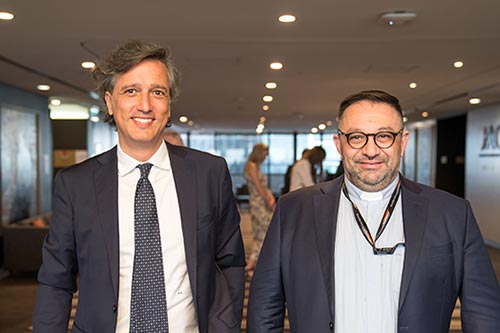A recent publication of the PM Glynn Institute sets out the individual and public interest is in keeping the seal of confession intact.
 Seal of Confession: The public interest in confidential communications was launched in April with a roundtable discussion, hosted by was ACU’s Canon Law Centre.
Seal of Confession: The public interest in confidential communications was launched in April with a roundtable discussion, hosted by was ACU’s Canon Law Centre.
Seal of Confession responds to questions in the public arena regarding the seal of confession, particularly following the recommendation of the Royal Commission into Institutional Responses to Child Sexual Abuse. The Commission recommended a mandatory reporting requirement if child abuse is revealed in the confessional — breaking the seal of confession.
Professor Michele Riondino, Director of the ACU Canon Law Centre and Foundation Chair of Canon Law at ACU, said the topic was an important issue in both secular and canon law. “Recent discussions in the public arena have focussed on the public interest in the confidentiality of communications in the confessional. Our topic sits at the intersection between the law of the church and the law of the land, and we are happy as a Canon Law Centre to make a contribution to this paper, with the PM Glynn Institute.”
Dr Casey also discussed how this well-meaning law could, in practice, be counterproductive, as confession acts as a first step in bringing wrongdoing into the light.
Reverend Dr Julian Wellspring, Judicial Vicar for the Interdiocesan Tribunal of Sydney, explained the practice of confession, and discussed how the anonymity of confession made the recommendation of the Royal Commission unworkable.
He emphasised that the canon law of the Catholic Church is clear: the seal of confession must never be betrayed. The Holy See has stipulated that priests who do so are guilty of a very grave offence which incurs automatic excommunication and prohibits them from carrying out any ministry as a priest.
Eminent barrister Terry Tobin QC GCSG made it clear that this issue is not merely academic and that it could become an indirect threat to the Church itself. He identified that, even though this mandatory reporting requirement would be of little practical utility, it could easily become a government requirement for priests to declare that they will report confessions, and therefore break the seal, as a condition for being granted a child protection clearance, without which they cannot undertake public ministry. He also engaged the audience by recounting historical accounts of how slow, incremental changes to the law can create serious challenges for fundamental rights, and encouraged people of faith to be vigilant if they are to maintain freedom of religion.
Special items from the ACU’s Rare Books collection were on display at the event, including an 1836 pamphlet Dens’ Theology. Nature of Confession, and The Obligation of the Seal. This contains early examples of colonial vitriol towards the seal of the “Romish confessional”, and situated the discussion in its much longer historical context.
Participants in the roundtable discussion included politicians from the NSW Parliament, Mr. Andrea De Felip (Consul General of Italy in NSW), members of the Catholic clergy including Father Anthony Casamento (the Vice-President of ACU), and academics from various universities.
After the event, Gabrielle Upton MP, Chair of the NSW Parliament’s Joint Select Committee on the Anti-Discrimination Amendment (Religious Freedoms and Equality) Bill 2020, said: "It was good to learn about ACU’s paper Seal of Confession, which provided me with a much better understanding of the important public issues it relates to.”
NSW Parliamentarian, Kevin Connolly MP, said of the event: "The roundtable discussion has been useful in clarifying the public interest currently served by having the seal of confession, which would be lowered if we rushed to pursue the Royal Commission's recommendation."
Image: Dr Michele Riondino, Director of the ACU Canon Law Centre, and Father Anthony Casamento CSMA, Vice President of ACU at the Roundtable.
We're available 9am–5pm AEDT,
Monday to Friday
If you’ve got a question, our AskACU team has you covered. You can search FAQs, text us, email, live chat, call – whatever works for you.